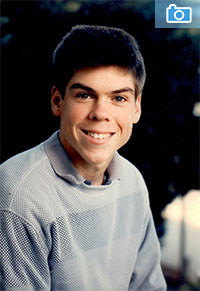Brian Othmer
 All children are unique, but some veer from the expected path toward maturity more than others. Brian was one of those. Born in Ithaca, New York, while both his mother and I were completing graduate work at Cornell, Brian started out life normally enough. The problems started showing up when he was in preschool. Initially they were just behavioral problems, nothing to be terribly alarmed about, but in third grade matters became rapidly intractable. After he was expelled by his school, our pediatrician considered a neurological explanation for the bizarre behaviors. This insight led to a diagnosis of temporal lobe epilepsy, and gave us the first indication that Brian’s behavior could be explained best by understanding what was happening in his brain.
All children are unique, but some veer from the expected path toward maturity more than others. Brian was one of those. Born in Ithaca, New York, while both his mother and I were completing graduate work at Cornell, Brian started out life normally enough. The problems started showing up when he was in preschool. Initially they were just behavioral problems, nothing to be terribly alarmed about, but in third grade matters became rapidly intractable. After he was expelled by his school, our pediatrician considered a neurological explanation for the bizarre behaviors. This insight led to a diagnosis of temporal lobe epilepsy, and gave us the first indication that Brian’s behavior could be explained best by understanding what was happening in his brain.
Brian was helped by anticonvulsant medication, but most of his problems continued, just in an attenuated fashion. Our family muddled through for nine years, during which time Brian reached the 11th grade in the care of a Waldorf school.
Then a chance encounter altered all of our lives. We found out about a strange new therapy called EEG biofeedback, or neurofeedback. The pioneering practitioner who offered the therapy had her practice only a few miles away in Beverly Hills. This was our good fortune, as she assured us that she was the only one in the world offering this treatment clinically. (It was being researched formally in two universities.) In our state of desperation, we had to try it…the year was 1985.
This was the turning point in Brian’s life. The training systematically improved all of the behavioral, cognitive, and emotional symptoms that were still plaguing him. The rest of the family benefited from the training as well. At one level, Brian realized that there was now a way in which he could help his own cause through techniques such as neurofeedback. And at another level, Brian realized that options were opening up to him that could not be considered previously: He was headed for college.
Brian went on to have a highly successful college career, with a focus on computer science and mathematics. During summers, he helped us with our task of computerizing the neurofeedback technique in order to benefit a larger number of people. And he continued to train his own brain.
Seizure disorder was poorly understood at the time; in fact, it still is. Brian’s epilepsy remained insufficiently controlled with the combination of meds and neurofeedback, and he suffered occasional breakthrough seizures, most likely triggered by dietary factors that he could not tolerate. Near the end of his last year in college, he suffered a fatal seizure in the middle of the night.
Brian left us a journal from his years in college, and it has yielded to us valuable insights into how he viewed his own condition, his relationship to others, his goals for the future, and basic issues such as the role of the brain in shaping the self.
The instrument for which he wrote some of the software went on to become the largest selling product in this nascent field, and it defined the path forward for others. The field of neurofeedback is now at the threshold of general acceptance. Neurofeedback is a boot-strapping strategy in which the brain acquires better function solely on the basis of information about itself. It is reasonable to project that neurofeedback is the pathway by which the entire field of mental health will be overhauled. The field of education will be radically affected as well. Brian played a key role in the emergence of this revolutionary method into more general awareness.
In his short life of twenty-two years, Brian left a large imprint on his world, an impact of which he himself was hardly aware. The largest repercussions going forward will be at the conceptual level: how we will come to see ourselves once we understand the role of the brain in regulating our own lives. Brian had to come to terms with ‘brain-driven’ behavior because of the nature of his own condition. But we are all subject to the same rules. Our next frontier is the inner one of coming to terms with our brains. We will run across Brian’s footprints because he has already been there.